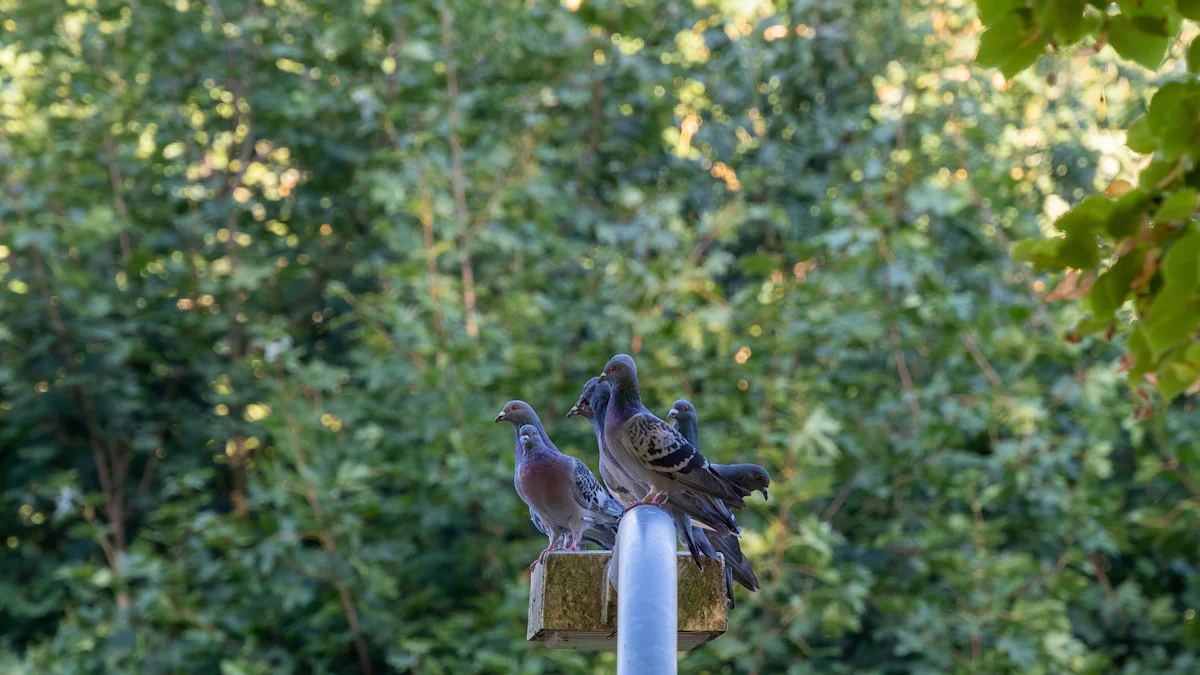
Bird droppings pose a significant health risk. You might wonder, can bird poop make you sick? The answer is yes. These avian droppings harbor over 60 different diseases, including histoplasmosis, cryptococcosis, and psittacosis. When these droppings dry, they can become airborne, increasing the risk of illness. Awareness of these dangers is crucial. By understanding the potential health threats from avian droppings, you can take preventive measures to protect yourself and your community.
Key Takeaways
Bird droppings can transmit over 60 diseases, including histoplasmosis, psittacosis, and salmonellosis, posing significant health risks.
Recognizing symptoms such as respiratory issues, gastrointestinal discomfort, and general malaise is crucial for early diagnosis and treatment.
Practice good hygiene by washing hands thoroughly after contact with bird droppings and wearing protective clothing when cleaning contaminated areas.
Use safe cleaning methods, like dampening droppings before cleaning to prevent airborne particles, and dispose of waste properly to minimize health risks.
Implement bird control measures, such as installing spikes or nets, to reduce exposure to droppings in your environment.
Educate yourself and your community about the dangers of bird droppings and promote awareness to prevent disease transmission.
Seek medical attention promptly if you experience persistent or severe symptoms after exposure to bird droppings.
Common Diseases from Bird Droppings

Bird droppings can harbor a variety of diseases that pose significant health risks. Understanding these diseases helps you take preventive measures to protect yourself.
Histoplasmosis
Histoplasmosis is a fungal infection caused by inhaling spores found in bird droppings. This disease primarily affects the respiratory system.
Symptoms
You might experience flu-like symptoms such as fever, chest pain, and a dry cough. In severe cases, it can lead to pneumonia and acute respiratory distress syndrome.
Treatment
Doctors typically prescribe antifungal medications to treat histoplasmosis. Early diagnosis and treatment are crucial to prevent complications.
Psittacosis
Psittacosis, also known as parrot fever, is a bacterial infection transmitted from birds to humans. It is one of the transmissible bird diseases that can affect your health.
Symptoms
Symptoms of psittacosis include fever, headache, and a persistent cough. You may also experience muscle aches and chills.
Treatment
Antibiotics are effective in treating psittacosis. Prompt medical attention ensures a quicker recovery and reduces the risk of severe illness.
Cryptococcosis
Cryptococcosis is another fungal infection linked to bird droppings, particularly from pigeons and doves. This disease can impact your central nervous system and lungs.
Symptoms
You may notice respiratory symptoms such as cough and shortness of breath. In some cases, cryptococcosis can lead to meningitis, causing headaches and neck stiffness.
Treatment
Treatment involves antifungal medications. Early intervention is essential to manage the infection effectively and prevent serious health issues.
Salmonellosis
Salmonellosis is a bacterial infection that you can contract from bird droppings. This disease often affects your gastrointestinal system, leading to uncomfortable symptoms.
Symptoms
When you have salmonellosis, you might experience symptoms such as diarrhea, abdominal cramps, and fever. These symptoms usually appear within 12 to 72 hours after exposure. In some cases, you may also feel nauseous or vomit. The severity of symptoms can vary, but they typically last four to seven days. If you notice these symptoms, it's important to consider recent exposure to bird droppings as a potential cause.
Treatment
Treatment for salmonellosis focuses on managing symptoms and preventing dehydration. You should drink plenty of fluids to stay hydrated. In severe cases, doctors may prescribe antibiotics, especially if the infection spreads beyond your intestines. Prompt medical attention can help you recover more quickly and reduce the risk of complications. By understanding the risks associated with bird droppings, you can take steps to protect yourself from salmonellosis and other diseases like avian influenza and cryptosporidiosis.
Symptoms to Watch For
When dealing with bird droppings, you should be aware of various symptoms that might indicate an illness. Recognizing these symptoms early can help you seek timely medical attention and prevent complications.
Respiratory Symptoms
Bird droppings can release spores and bacteria into the air, which you might inhale. This exposure can lead to respiratory symptoms. You may experience coughing, shortness of breath, or chest discomfort. These symptoms often resemble those of common respiratory infections. However, if you've been around bird droppings, consider the possibility of diseases like histoplasmosis. This fungal infection primarily affects the lungs and can cause severe respiratory issues if not treated promptly.
Gastrointestinal Symptoms
Bird droppings can contaminate food and water sources, leading to gastrointestinal symptoms. You might notice nausea, vomiting, or diarrhea after exposure. Salmonellosis, a bacterial infection, often presents with these symptoms. It can result from direct contact with infected birds or their droppings. If you experience these symptoms, especially after handling birds or cleaning areas with droppings, it's crucial to consider this potential source of infection.
General Symptoms
In addition to specific respiratory and gastrointestinal symptoms, you might encounter general symptoms. These can include fever, fatigue, and muscle aches. Such symptoms often accompany zoonotic diseases transmitted from birds to humans. Psittacosis, for example, can cause fever and headache, making it essential to monitor your overall health if you've been exposed to bird droppings. Early recognition of these symptoms can lead to quicker diagnosis and treatment, reducing the risk of severe illness.
By staying vigilant and recognizing these symptoms, you can protect yourself from the health risks associated with bird droppings. Awareness and prompt action are key to maintaining your well-being.
How to Protect Yourself from Bird Diseases

Protecting yourself from bird diseases involves adopting effective hygiene practices, safe cleaning methods, and strategies to avoid exposure. By following these guidelines, you can minimize the risk of illness from contact with bird feces.
Personal Hygiene Practices
Maintaining good personal hygiene is crucial in preventing transmission of diseases from avian droppings.
Handwashing
Wash your hands thoroughly with soap and water after any contact with bird feces. This simple act removes pathogens that might linger on your skin. Use hand sanitizer if soap and water are unavailable, ensuring it contains at least 60% alcohol for effectiveness.
Protective Clothing
Wear protective clothing when handling birds or cleaning areas contaminated with droppings. Gloves, masks, and long-sleeved shirts create a barrier between you and potential pathogens. These precautions reduce the likelihood of direct contact with bird feces, safeguarding your health.
Safe Cleaning Methods
Proper cleaning techniques help eliminate the health risks associated with bird droppings.
Cleaning Surfaces
Clean surfaces contaminated with bird droppings using a disinfectant. First, dampen the area to prevent dust and spores from becoming airborne. Then, scrub the surface with a suitable cleaning agent. This method effectively removes pathogens and reduces the risk of inhalation.
Disposal of Droppings
Dispose of bird droppings safely by sealing them in a plastic bag before discarding them in the trash. This practice prevents the spread of pathogens and minimizes environmental contamination. Always wear gloves during this process to avoid direct contact with bird feces.
Avoiding Exposure
Limiting your exposure to bird droppings is essential in preventing disease transmission.
Bird Control Measures
Implement bird control measures to reduce the presence of birds in your environment. Install bird spikes, nets, or other deterrents to keep birds away from your home or workplace. These measures decrease the accumulation of droppings and lower the risk of disease.
Safe Handling of Birds
Handle birds safely by using appropriate equipment and techniques. Avoid direct contact with bird feces and always wash your hands afterward. If you work with birds regularly, consider receiving training on safe handling practices to further protect yourself from bird diseases.
By following these guidelines, you can effectively protect yourself from the health risks associated with bird droppings. Awareness and proactive measures are key to maintaining your well-being.
When to Seek Medical Attention
Recognizing when to seek medical attention is crucial if you suspect an illness related to bird droppings. Early intervention can prevent complications and ensure a quicker recovery.
Persistent Symptoms
If you experience symptoms that persist beyond a few days, it's important to consult a healthcare provider. Respiratory issues, such as a persistent cough or difficulty breathing, may indicate a more serious condition like histoplasmosis or cryptococcosis. Similarly, ongoing gastrointestinal symptoms, such as diarrhea or abdominal pain, could suggest salmonellosis. These symptoms might not resolve on their own and require medical evaluation. Various experts emphasize the importance of seeking medical advice if you develop symptoms after exposure to bird droppings. They recommend avoiding contact with bird feces and practicing good hygiene to reduce the risk of zoonotic diseases.
Severe Reactions
Severe reactions demand immediate medical attention. If you experience high fever, severe headache, or chest pain, these could be signs of a serious infection. Conditions like psittacosis can escalate quickly, leading to complications if untreated. Experts in bird-related diseases highlight the need for awareness of the risks associated with bird feces, especially for those who work closely with birds. They advise wearing protective gear and maintaining proper hygiene to prevent severe illnesses. If you notice any alarming symptoms, don't hesitate to seek medical help. Prompt action can make a significant difference in your recovery and overall health.
Importance of Awareness
Understanding the health risks associated with bird droppings is crucial for your well-being. By increasing awareness, you can take proactive steps to protect yourself and your community from potential diseases.
Educating the Public
Educating the public about the dangers of bird droppings plays a vital role in disease prevention. You can start by sharing information with friends and family. Discuss the common diseases linked to bird droppings, such as histoplasmosis and psittacosis. Highlight the importance of recognizing symptoms early and seeking medical attention if needed.
Consider organizing community workshops or informational sessions. Invite experts, such as healthcare providers, to speak about the health risks and preventive measures. These events can provide valuable insights and encourage open discussions. You can also distribute educational materials, like brochures or flyers, to reach a wider audience.
Community Health Initiatives
Community health initiatives can significantly reduce the risk of diseases from bird droppings. Collaborate with local health departments to implement programs that focus on prevention and education. These initiatives can include regular clean-up drives to remove bird droppings from public areas. Encourage community members to participate and raise awareness about the importance of maintaining a clean environment.
Support the installation of bird control measures in public spaces. This can help minimize the presence of birds and reduce the accumulation of droppings. Advocate for policies that promote safe handling practices for birds, especially in areas where people frequently interact with them.
By actively participating in these initiatives, you contribute to a healthier community. Your efforts in spreading awareness and promoting preventive measures can make a significant difference in reducing the health risks associated with bird droppings.
Myths and Misconceptions about Bird Droppings
Bird droppings often carry a reputation that is clouded by myths and misconceptions. Understanding the truth behind these beliefs can help you make informed decisions about your health and safety.
Common Misunderstandings
Bird Droppings Are Harmless: Many people believe that bird droppings pose no threat to human health. This misconception can lead to negligence in handling and cleaning up droppings. In reality, bird droppings can harbor over 60 diseases, including histoplasmosis and psittacosis. These diseases can cause serious health issues, especially if you have a weakened immune system.
Only Fresh Droppings Are Dangerous: Some individuals think that only fresh bird droppings pose a risk. However, dried droppings can become airborne, allowing you to inhale harmful spores and bacteria. This airborne transmission increases the risk of respiratory diseases. Always exercise caution when dealing with both fresh and dried droppings.
All Birds Carry the Same Risks: Not all birds carry the same health risks. Pigeons and doves, for example, are more likely to spread cryptococcosis. Parrots and other pet birds can transmit psittacosis. Understanding the specific risks associated with different bird species can help you take appropriate precautions.
Facts vs. Fiction
Fact: Bird droppings can transmit diseases to humans. You might contract infections like salmonellosis from contact with contaminated surfaces or food. The outbreak of Salmonella Typhimurium from wild animals, such as songbirds, highlights the need for public awareness about these risks.
Fiction: Bird droppings only affect those who work with birds. While individuals who handle birds regularly face higher risks, anyone can be exposed to bird droppings in public spaces. Parks, sidewalks, and buildings often have bird droppings that can pose health hazards to the general public.
Fact: Awareness and prevention are crucial. Public awareness of zoonoses, diseases transmitted from animals to humans, has increased due to their health and economic impacts. By staying informed and taking preventive measures, you can protect yourself and your community from potential illnesses.
Understanding the myths and facts about bird droppings empowers you to make safer choices. By dispelling misconceptions, you can take proactive steps to minimize health risks and promote a healthier environment.
Awareness and prevention play a crucial role in safeguarding your health from the potential dangers of bird droppings. By understanding how bird droppings can make you sick, you can take proactive measures to minimize the risk of illness. Recognizing the symptoms associated with exposure to avian droppings allows you to seek timely medical attention, reducing the likelihood of severe health issues. Staying informed about these hazards not only protects you but also benefits your community. Embrace the knowledge that bird droppings, while seemingly harmless, can pose significant health challenges if not managed properly.
FAQ
What diseases can you get from bird droppings?
Bird droppings can transmit over 60 diseases. Some common ones include histoplasmosis, psittacosis, cryptococcosis, and salmonellosis. Each of these diseases poses unique health risks, primarily affecting your respiratory and gastrointestinal systems.
How do bird droppings become airborne?
When bird droppings dry, they can crumble into fine particles. These particles can become airborne, especially during cleaning or windy conditions. Inhaling these particles can expose you to harmful spores and bacteria.
Can you prevent diseases from bird droppings?
Yes, you can take several precautions. Wear protective gear like gloves and masks when cleaning areas with bird droppings. Wash your hands thoroughly afterward. Avoid touching your face during the cleaning process to minimize the risk of infection.
Are all birds equally dangerous?
Not all birds carry the same health risks. Pigeons and doves are more likely to spread cryptococcosis, while parrots can transmit psittacosis. Understanding the specific risks associated with different bird species helps you take appropriate precautions.
How can you safely clean bird droppings?
To clean bird droppings safely, dampen the area first to prevent dust and spores from becoming airborne. Use a disinfectant to scrub the surface. Seal the droppings in a plastic bag before discarding them to prevent the spread of pathogens.
Should you avoid birdfeeders and birdbaths?
During an active disease outbreak, consider reducing or eliminating the use of birdfeeders and birdbaths. These can become sources of infection for both birds and humans. Regular cleaning and maintenance can help mitigate these risks.
What symptoms should you watch for after exposure?
After exposure to bird droppings, watch for respiratory symptoms like coughing and shortness of breath. Gastrointestinal symptoms such as diarrhea and abdominal pain are also common. General symptoms include fever and fatigue. Seek medical attention if symptoms persist.
Can bird droppings affect your pets?
Yes, bird droppings can pose health risks to pets. Pets might ingest contaminated droppings or inhale airborne particles. Keep pets away from areas with bird droppings and ensure they have clean water and food sources.
Is it safe to handle birds?
Handle birds with care. Use appropriate equipment and techniques to avoid direct contact with bird feces. Wash your hands thoroughly after handling birds. If you work with birds regularly, consider receiving training on safe handling practices.
Why is public awareness important?
Public awareness is crucial for preventing diseases from bird droppings. Educating yourself and others about the risks and preventive measures can help protect your community. Participate in community health initiatives to promote a safer environment.
In summary, while bird droppings can pose health risks, being aware and taking preventive measures can help you enjoy birdwatching safely. Remember, maintaining a clean environment is key. If you're looking to attract more birds while minimizing potential mess, check out our smart bird feeders! They not only make birdwatching more enjoyable but also help reduce the chances of droppings around your space. Explore our products today and enhance your birding experience!













